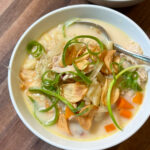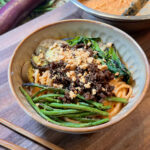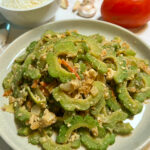Atchara is a tangy and sweet condiment made from green, unripe papayas. Lending its fresh, pickled taste to foods, you’ll want this as a side for everything!
How do I eat atchara?
As with any pickled veggies, atchara can be used in almost everything that you think needs that little extra tang or sour-kick.
Think of it like Do Chua (Vietnamese pickled carrots and daikon), where it’s commonly served with savory dishes and Banh mi (Vietnamese sub sandwhiches). Or even Gari (Japanese pickled sushi ginger), where it’s used a palate cleanser between each piece of sushi.
Atchara is no different! It is typically served with fried or grilled foods to cut and/or balance out their smoky and rich flavors. It’s acidic, sweet, and slightly salty, which tremendously helps in refreshing your palate between each bite of food.

Living the majority of my life in the West and away from home, I unfortunately have not had the luxury to have access to Filipino street food, where atchara has become a staple condiment. I had to find other clever ways (although not traditional) to use atchara and here’s a brief list of my favorites:
- Sandwiches (sliders, burgers, hotdogs)
- Salads
- Charcuterie platters
- Rice or noodle dishes (as a garnish)
Here’s a list of other recipes that atchara is perfect with:
- Chicken Inasal (Chicken Barbecue)
- Lumpia (Filipino Springrolls)
- Barbecue Beef Short Ribs
Ingredients
- 650 g green papaya, julienned (about 1 green papaya)
- 75 g carrot, julienned (about 1 medium carrot)
- 50 g green bell pepper, julienned (1/4 of a whole green bell pepper)
- 50 g red bell pepper, julienned (1/4 of a whole red bell pepper)
- 1 tbsp salt
Pickling liquid:
- 3 cups cane vinegar (or regular white vinegar)
- 1.5 cups sugar
- 1.5 tsp salt
- 1/2 tsp ground black pepper
- 1/2 head of garlic, thinly sliced
The most important ingredient for this pickle dish is GREEN PAPAYAS, which are essentially unripened papayas.
Because they’re not fully ripened, they tend to be flavorless and odorless. It’s commonly used in Southeast Asian cuisines (such as Thai) to lend dishes its natural sweetness and characteristic crisp, crunchy texture.


Green papayas are particularly sold in Asian markets, specifically in ones that carry or specialize in Southeast Asian products and produce.
When shopping for these papayas, look for a green skin with pale-green or white-tinted flesh. Any papaya leaning towards the orange-colored side might change the flavor of this atchara entirely, so go with your best judgement!
Instructions
Julienne the green papaya, carrot, and bell peppers. Doing this by knife/hand would be too time-consuming so I just used one of those julienne peelers to make my life easier!
Transfer these to a bowl and sprinkle with a tbsp of salt to draw out their moisture. Let sit for 30 minutes.


After 30 minutes, pour out the excess liquid accumulated at the bottom of your container. Rinse the julienned veggies with cold water at least 3 times to remove the salt.
Squeeze out as much water as possible (using a clean dish towel or cheese cloth) and transfer to containers of your choice.

In a saucepan, combine together the vinegar, sugar, salt, black pepper, and garlic. Bring this mixture to a boil to dissolve the sugar, then simmer for 5 mins.

Pour the hot pickling liquid into your container, submerging the vegetables completely. Lightly stir with a fork or chopsticks to evenly distribute the pickling liquid.

Let marinate for at least 24-48 hours before eating!
How do I store atchara?
I personally like to keep my atchara in the fridge stored in mason jars or any airtight sealed containers to make them last longer.
Atchara can usually last 2-3 months in the fridge.
Disclosure: Some links on this page are affiliate links, meaning that at no additional cost to you, we may receive compensation from purchases made through these links. As an Amazon Associate, I can earn from qualifying purchases.








Pingback: Soy Marinated Filipino Short Ribs - iankewks
Pingback: Seared Peanut Bok Choy | Iankewks
Pingback: Filipino Beef Tapa | Iankewks
Pingback: Skinless Filipino Longganisa | Iankewks
Pingback: Pork Tocino | Iankewks